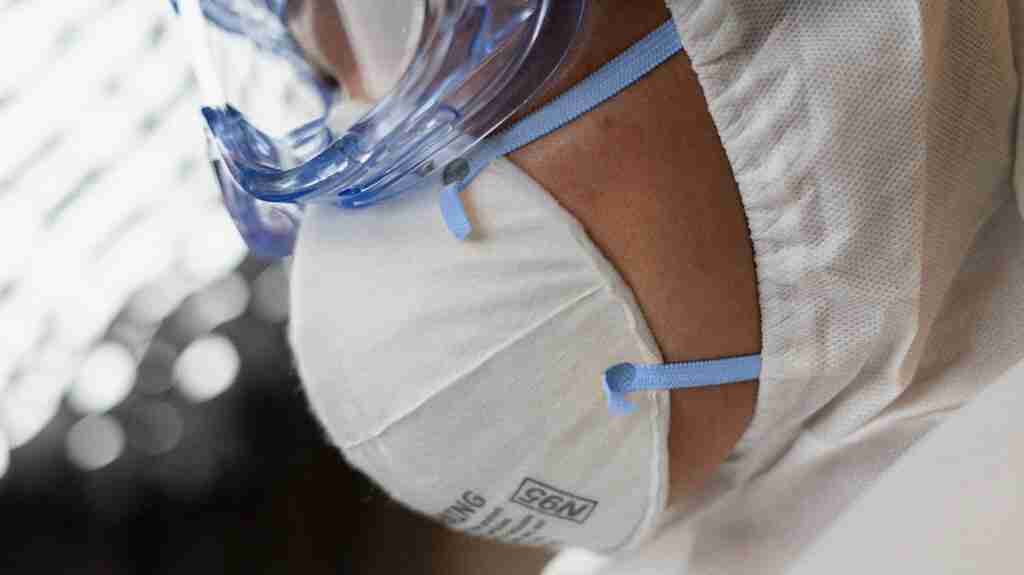New research has found that dry heat from an electric cooker can effectively sanitize N95 masks.

A new study has found that electric cookers in the home can effectively sanitize N95 respirators, which are key pieces of personal protective equipment (PPE) in the current COVID-19 pandemic.
These findings, which appear in the journal Environmental Science & Technology Letters, could help relieve the pressure on the limited supply of N95 respirators, which are usually single-use items.
A key part of the world’s effort to mitigate the spread of COVID-19 is the use of PPE.
COVID-19 typically spreads when a person expels droplets carrying the new coronavirus, SARS-CoV-2, from their mouth or nose.
If the droplets come into contact with another person, there is a chance that they will gain access to their respiratory tract, where the virus will infect cells to cause disease.
PPE can take the form of gowns, visors, gloves, and masks. It forms a barrier between people and is crucial for care workers and clinical staff who may be in close contact with people with SARS-CoV-2.
The sudden emergence and rapid spread of the new coronavirus have created a huge demand for PPE. This demand has, in many cases, outstripped supply. This means that many carers and clinical staff who need the equipment are having to make do with substandard products or without any PPE at all.
This not only puts carers’ lives at risk but also significantly increases the chances of the virus spreading, thereby also endangering other people’s lives.
Masks are an important part of PPE; they both protect the wearer from infection and stop the wearer from spreading the virus to others. The gold standard in masks is N95 respirators, which not only block droplets but can also block 95% of fine particles — hence the name N95.
N95 masks are one of the mask types that the World Health Organization (WHO) recommend for use in COVID-19 intensive care units, indicating their efficacy.
As study co-author Prof. Thanh Nguyen, of the University of Illinois at Urbana-Champaign, points out, “A cloth mask or surgical mask protects others from droplets the wearer might expel, but a respirator mask protects the wearer by filtering out smaller particles that might carry the virus.”
However, these respirators are in short supply. Authorities in the United States do not recommend that the public wear N95 respirators. This is to prevent putting even more strain on the supply of the masks.
In light of this short supply, recent research has explored the viability of decontaminating N95 respirators, which manufacturers typically design for single use.
In the new study, the researchers had five conditions for an effective decontamination process:
- It should kill a variety of viruses.
- It should not negatively affect the respirator’s filtration ability.
- It should still let the respirator maintain a tight fit against a person’s face.
- It should not leave harmful chemicals on the respirator.
- The process should be easily accessible.
According to study co-author Prof. Vishal Verma, also of the University of Illinois at Urbana-Champaign, “There are many different ways to sterilize something, but most of them will destroy the filtration or the fit of an N95 respirator.”
“Any sanitation method would need to decontaminate all surfaces of the respirator, but equally important is maintaining the filtration efficacy and the fit of the respirator to the face of the wearer. Otherwise, it will not offer the right protection.”
– Prof. Vishal Verma
Based on these five conditions, the researchers speculated that dry heat may be able to successfully sterilize an N95 respirator. A variety of household appliances, including electric ovens and rice cookers, can produce dry heat without producing harmful chemicals and with a low risk of damaging filtration.
The researchers did three experiments:
- The first was to determine the effectiveness of decontamination. It involved four viruses, including a coronavirus with a structure similar to that of SARS-CoV-2.
- The second was to determine filtration.
- The third was to determine fit.
After running a series of tests heating N95 respirators in a commercially available electric cooker, the researchers found that 50 minutes of dry heat at 212ºF (100ºC) could decontaminate the masks without reducing their effectiveness.
The electric cooker decontaminated the masks, inside and out, even more effectively than UV light.
“We built a chamber in my aerosol-testing lab specifically to look at the filtration of the N95 respirators, and [we] measured particles going through it,” says Prof. Verma.
“The respirators maintained their filtration capacity of more than 95% and kept their fit, still properly seated on the wearer’s face, even after 20 cycles of decontamination in the electric cooker.”
The researchers hope that their findings may be valuable for small clinical units that are unable to access enough N95 respirators or for members of the public who have an old N95 respirator at home.
The scientists have produced a video giving instructions on how to go about decontamination, pointing out that people should separate the respirators from the surface of the cooker using a towel. They also suggest that people stack multiple respirators together and decontaminate them all in one go.